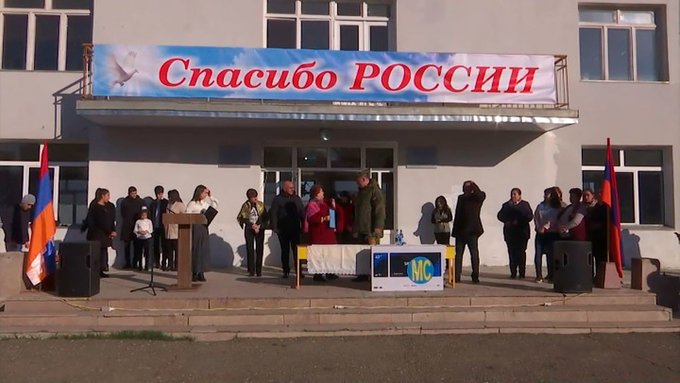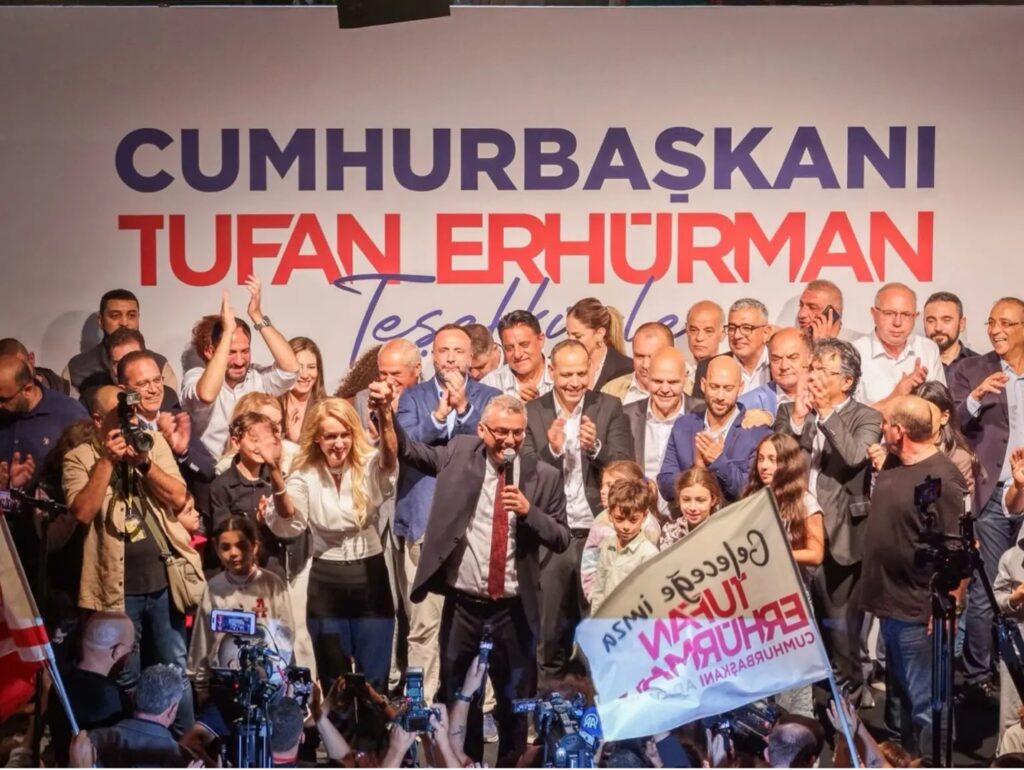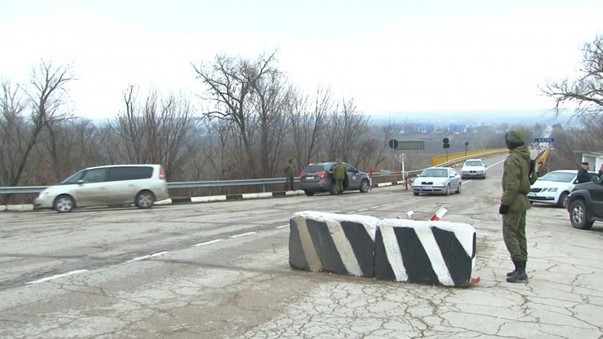Is Russia Winning the Second Karabakh War?
During the 44-day conflict in and around the de facto state of Nagorno-Karabakh (NKR), Russia played a noticeably passive role. The Kremlin, in an agreement to protect Armenia, felt no need to intervene because Azerbaijan did not attack Armenia directly. Over the last decades, Russia achieved economic gains in selling weapons to both sides, and after the Azerbaijani armed forces overtook the strategic town of Shusha, Russia acted decisively to achieve geopolitical gains. The ceasefire agreement reached after this decisive last battle bears Vladimir Putin’s signature and now Russia plays the main role in maintaining security in the region with its peace-keepers. Russia retains its normal relations with Azerbaijan, Armenia, and Turkey, while in Stepanakert schools put up signs with “thank you Russia”, de facto state legislators propose giving Russian an official status, and the Foreign Minister Babayan has openly discussed the possibility of receiving Russian passports for Karabakhi Armenians. The good publicity Russia is receiving due to the peace agreement outweighs any of the costs associated with their peace-keeping mission. The geopolitical advance Russia made and will hold for at least the next five years is priceless.
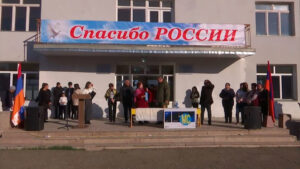
Image: “Thank you, Russia” at the front door of Stepanakert school house (Source: вести.ру)
Clearly, Azerbaijan made significant gains during the conflict: regaining territories which were occupied by Armenia since 1994, securing a direct route to the Nakhchivan exclave, and capturing swaths of southern Nagorno-Karabakh, originally belonging to NKAO in 1989. After the cease-fire agreement, Azerbaijanis flooded the streets in Baku to show their support for their president, Ilham Aliyev. But now that the war is over, the hard work begins. Aliyev has revealed plans to pump nearly 60 billion USD into the region to revitalize it and give the chance to those who lived there some 30 years ago, to return. This investment is massive, but the government is using it as an opportunity to invest in industries not involved in Azerbaijan’s otherwise key oil and gas industry. Nevertheless, this huge project will take time and to insure it is worth it, the government in Baku should focus on keeping peace in the region. Aliyev knows this, but his iron fist policies and provocations will hinder this endeavor. Last week in a press conference, Aliyev stated that it has consistently been Azerbaijan’s policy to “economically undermine, destroy, and isolate Armenia […] as long as our lands are under occupation“.
Furthermore, his government has named Shusha the Azerbaijani capital of culture and now hopes to make it a gleaming town on a hilltop which Karabakhi Armenians below can only envy. But, Aliyev is not likely to find much sympathy abroad; Azerbaijan remains the most restrictive regime in the Southern Caucasus. News on radicalized mercenaries fighting in the war and about unreleased dozens of Armenian prisoners of war, have cost reputation. Making further territorial gains is also out of question now. With Russian peace-keepers in the region, the status quo after the full implementation of the cease-fire agreement will likely be reminiscent of other de facto states in the post-Soviet space. Getting Russia out of the region will be nearly impossible and advancing the frontline when Russia is there is also unthinkable. In the end, Azerbaijan may have regained control over lost territories, but the path forward is rocky and costly to say the least.
Certainly, Armenia cannot claim victory in the war either. The ceasefire agreed upon with the consent of Armenian Prime Minister Pashinyan was the catalyst for an ongoing political crisis in Armenia. Regular protests against Pashinyan continue on and nearly 40% of Armenians think he should resign. Last week a leading figure in the Armenian armed forces, Onik Gasparyan, called for Pashinyan’s resignation – he was dismissed shortly afterward. In a strange turn of events, even the president of Nagorno-Karabakh said he would be ready to mediate to help overcome the political unrest in Armenia. Many Armenians have expressed positive views of Russia’s role in brokering peace, but still channel their anger with their territorial losses towards the current government. The opposition forces do not want to accept the cease-fire agreement – still about 30% of the population wants to try and reclaim what was lost throughout the fighting in the autumn. The pro- and anti-government camps have been pitted against each other and their regular demonstrations are leading to a further polarization of Armenian society.
Nagorno-Karabakh, now much smaller in size, has had to make some uncomfortable adjustments since the cease-fire agreement in November 10. Throughout the war, the question of recognition of this de facto state, based on its good record on democracy and human rights, was discussed in isolated cases in the West. Now that the war is over, however, any rumors have subsided. Armenia’s stance on the issue also remains unchanged and their non-recognition now has essentially the same justification as it has previously had. For the time being, domestic issues surrounding rebuilding are the necessary priority. The government in Stepanakert is asking for international aid to assist in rebuilding homes and economic infrastructure to allow the remaining third (around 45,000) of Karabakhi Armenians which fled during the war to return home.
Despite security concerns, the government has spoken very positively of the Russian peace-keepers in the region. Movement through the Lachin corridor and around the external border seems to be running smoothly. The aforementioned banners on schools thanking Russia and the government debate on implementing Russian as a secondary official language are signs of the weakened position of the de facto regime. In order to retain the territory it now controls, and to avoid their most grave fear of being completely swallowed by Azerbaijan, the government of NKR is cozying up to Russia. So long as Russian peace-keepers are in the region, Azerbaijan will not make any further advancements. While approving the passportization, intensively practiced in other conflicts of the post-Soviet space, de facto state authorities believe that the security in Karabakh will be enhanced if the Kremlin feels it’s protecting its own citizens there, essentially turning security in the South Caucasus from a geopolitical interest into a domestic policy issue. This may help stabilize the region, but it is a blow to the image of “independent statehood” and therefore, many Karabakhi Armenians are not happy with giving up essential sovereignty requisites to Russia.
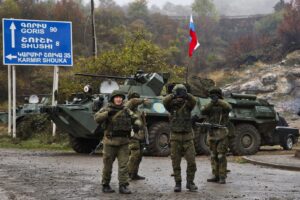
Image: Russian peacekeepers in the entrance to Stepanakert (Source: Jack Losh).
Active conflict has subsided in Nagorno-Karabakh, which is, by all means, a positive thing that I do not wish to understate. Just as in all conflicts, this war has its winners and losers, but in the case of Nagorno-Karabakh, these sides cannot be defined in a traditional sense. Azerbaijan made territorial gains, but now faces the extreme costs of continuing this project of national pride. The cease-fire agreement has provided physical security, but the rhetoric of Aliyev will not allow any wounds to heal in the near future. Any desire to utilize another quick and powerful offensive to capture more territory will be impossible as long as Russian troops are around. The conflict has spun Armenia into months of political unrest, and the government in Stepanakert, once praised for its democratic success, is now totally reliant on the notorious Putin regime as the only assurance for safety and security.
In this war, Azerbaijan, Armenia, and Nagorno-Karabakh are all losers, albeit not equally. Russia is the real winner of the Second Karabakh War. Not only did Russia profit off the arms build-up of both sides over the last decades, but Russia was also able to avoid any scrutiny during the conflict by remaining totally reserved. The Kremlin was then praised for playing a central role in mediating the cease-fire. Now Moscow has secured major influence over the region through its some 2,000 peace-keeping troops whose mission is likely to be extended after the five-year agreement. A continuation of the steps agreed upon in the cease-fire agreement will allow all sides to reap the benefits of peace, cooperation, and trust-building. That being said, successful peace will most drastically improve Russia’s image in diplomacy abroad and solidify their geopolitical strength and influence in the South Caucasus which makes Russia the clear winner of the war in Nagorno-Karabakh.
Author: Lance Bradley


